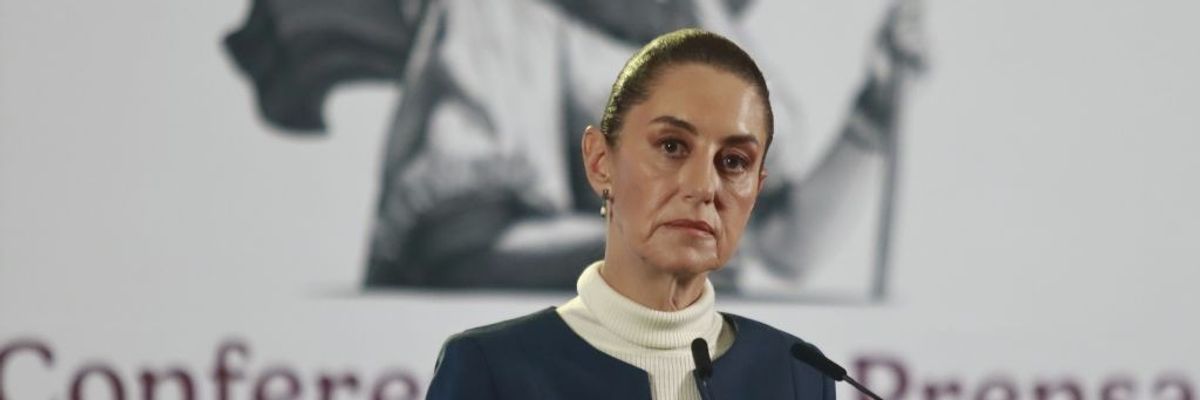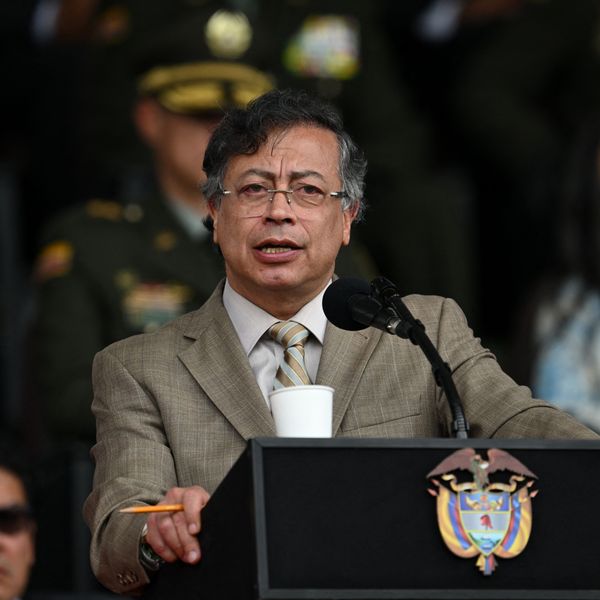
Mexican President Claudia Sheinbaum speaks at an event in Mexico City on November 20, 2024.
Mexico's Leftist President Rips Trump Tariff Threat
"If even a small percentage of what the United States allocates to war were instead dedicated to building peace and fostering development, it would address the underlying causes of human mobility," wrote Mexican President Claudia Sheinbaum.
Mexican President Claudia Sheinbaum on Tuesday sharply criticized U.S. President-elect Donald Trump's threat to impose a 25% tariff on all imported goods from Canada and Mexico, calling the proposal a potentially disastrous distraction from meaningful solutions to drug trafficking and mass migration.
"Migration and drug consumption in the United States cannot be addressed through threats or tariffs," Sheinbaum, a member of Mexico's leftist Morena party, wrote in a letter to Trump. "What is needed is cooperation and mutual understanding to tackle these significant challenges."
Sheinbaum warned that if Trump follows through with his threat, "there will be a response in kind, until we put at risk our shared enterprises," echoing economists' concerns that such sweeping tariffs could result in higher prices for consumers, job losses, and a damaging trade war. Companies in the U.S. are already signaling that they would use tariffs on imports as a justification to raise consumer prices.
"Among Mexico's main exporters to the United States are General Motors, Stellantis, and Ford Motor Company, which arrived in Mexico 80 years ago," Sheinbaum wrote. "Why impose a tariff that would jeopardize them? Such a measure would be unacceptable and would lead to inflation and job losses in both the United States and Mexico."
"Tragically, it is in our country that lives are lost to the violence resulting from meeting the drug demand in yours."
Sheinbaum's letter to Trump was made public hours after the U.S. president-elect took to his social media platform, Truth Social, to fearmonger about a supposedly "unstoppable" migrant "caravan coming from Mexico."
Trump pledged to "sign all necessary documents to charge Mexico and Canada a 25% Tariff on ALL products coming into the United States" and said such tariffs would remain in place until Mexico and Canada—the nation's largest trading partners—halt the flow of migrants and drugs, particularly fentanyl, into the U.S.
"Both Mexico and Canada have the absolute right and power to easily solve this long simmering problem," Trump wrote. "We hereby demand that they use this power, and until such time that they do, it is time for them to pay a very big price!"
In her response, Sheinbaum wrote that Trump "may not be aware" that Mexico "has developed a comprehensive policy to assist migrants from different parts of the world who cross our territory en route to the southern border of the United States." Sheinbaum noted that the policy helped produce a major decline in migrant encounters at the U.S.-Mexico border over the past year.
"For these reasons, migrant caravans no longer arrive at the border," the Mexican president wrote. "Even so, it is clear that we must work together to create a new labor mobility model that is necessary for your country, as well as address the root causes that compel families to leave their homes out of necessity."
"If even a small percentage of what the United States allocates to war were instead dedicated to building peace and fostering development, it would address the underlying causes of human mobility," she added.
Sheinbaum went on to write that Mexico has "consistently expressed its willingness" to help stop fentanyl and weapons from entering the United States through its southern border.
"You must also be aware of the illegal trafficking of firearms into my country from the United States," she wrote. "Seventy percent of the illegal weapons seized from criminals in Mexico come from your country. We do not produce these weapons, nor do we consume synthetic drugs. Tragically, it is in our country that lives are lost to the violence resulting from meeting the drug demand in yours."
Canadian Prime Minister Justin Trudeau offered a far more vague response to Trump's tariff threat, telling reporters that he had a "good conversation" with the U.S. president-elect following his Truth Social post.
"This is a relationship that we know takes a certain amount of working on, and that's what we'll do," Trudeau said.
An Urgent Message From Our Co-Founder
Dear Common Dreams reader, The U.S. is on a fast track to authoritarianism like nothing I've ever seen. Meanwhile, corporate news outlets are utterly capitulating to Trump, twisting their coverage to avoid drawing his ire while lining up to stuff cash in his pockets. That's why I believe that Common Dreams is doing the best and most consequential reporting that we've ever done. Our small but mighty team is a progressive reporting powerhouse, covering the news every day that the corporate media never will. Our mission has always been simple: To inform. To inspire. And to ignite change for the common good. Now here's the key piece that I want all our readers to understand: None of this would be possible without your financial support. That's not just some fundraising cliche. It's the absolute and literal truth. We don't accept corporate advertising and never will. We don't have a paywall because we don't think people should be blocked from critical news based on their ability to pay. Everything we do is funded by the donations of readers like you. Will you donate now to help power the nonprofit, independent reporting of Common Dreams? Thank you for being a vital member of our community. Together, we can keep independent journalism alive when it’s needed most. - Craig Brown, Co-founder |
Mexican President Claudia Sheinbaum on Tuesday sharply criticized U.S. President-elect Donald Trump's threat to impose a 25% tariff on all imported goods from Canada and Mexico, calling the proposal a potentially disastrous distraction from meaningful solutions to drug trafficking and mass migration.
"Migration and drug consumption in the United States cannot be addressed through threats or tariffs," Sheinbaum, a member of Mexico's leftist Morena party, wrote in a letter to Trump. "What is needed is cooperation and mutual understanding to tackle these significant challenges."
Sheinbaum warned that if Trump follows through with his threat, "there will be a response in kind, until we put at risk our shared enterprises," echoing economists' concerns that such sweeping tariffs could result in higher prices for consumers, job losses, and a damaging trade war. Companies in the U.S. are already signaling that they would use tariffs on imports as a justification to raise consumer prices.
"Among Mexico's main exporters to the United States are General Motors, Stellantis, and Ford Motor Company, which arrived in Mexico 80 years ago," Sheinbaum wrote. "Why impose a tariff that would jeopardize them? Such a measure would be unacceptable and would lead to inflation and job losses in both the United States and Mexico."
"Tragically, it is in our country that lives are lost to the violence resulting from meeting the drug demand in yours."
Sheinbaum's letter to Trump was made public hours after the U.S. president-elect took to his social media platform, Truth Social, to fearmonger about a supposedly "unstoppable" migrant "caravan coming from Mexico."
Trump pledged to "sign all necessary documents to charge Mexico and Canada a 25% Tariff on ALL products coming into the United States" and said such tariffs would remain in place until Mexico and Canada—the nation's largest trading partners—halt the flow of migrants and drugs, particularly fentanyl, into the U.S.
"Both Mexico and Canada have the absolute right and power to easily solve this long simmering problem," Trump wrote. "We hereby demand that they use this power, and until such time that they do, it is time for them to pay a very big price!"
In her response, Sheinbaum wrote that Trump "may not be aware" that Mexico "has developed a comprehensive policy to assist migrants from different parts of the world who cross our territory en route to the southern border of the United States." Sheinbaum noted that the policy helped produce a major decline in migrant encounters at the U.S.-Mexico border over the past year.
"For these reasons, migrant caravans no longer arrive at the border," the Mexican president wrote. "Even so, it is clear that we must work together to create a new labor mobility model that is necessary for your country, as well as address the root causes that compel families to leave their homes out of necessity."
"If even a small percentage of what the United States allocates to war were instead dedicated to building peace and fostering development, it would address the underlying causes of human mobility," she added.
Sheinbaum went on to write that Mexico has "consistently expressed its willingness" to help stop fentanyl and weapons from entering the United States through its southern border.
"You must also be aware of the illegal trafficking of firearms into my country from the United States," she wrote. "Seventy percent of the illegal weapons seized from criminals in Mexico come from your country. We do not produce these weapons, nor do we consume synthetic drugs. Tragically, it is in our country that lives are lost to the violence resulting from meeting the drug demand in yours."
Canadian Prime Minister Justin Trudeau offered a far more vague response to Trump's tariff threat, telling reporters that he had a "good conversation" with the U.S. president-elect following his Truth Social post.
"This is a relationship that we know takes a certain amount of working on, and that's what we'll do," Trudeau said.
- Opinion | How Dems Can Take Advantage of Trump’s Tariffs to Reverse the Reagan Revolution | Common Dreams ›
- Calls for Trudeau to Resign as Exiting Canadian Finance Minister Warns of Trump Tariffs | Common Dreams ›
- Opinion | Tariffs Should Be a Scalpel, Not a Sledgehammer | Common Dreams ›
- Trump Follows Through With High Tariffs on Canada, Mexico, and China | Common Dreams ›
- Ontario 'Ripping Up' Contract With Musk's Starlink as Canada Targets Trump Allies in Trade War | Common Dreams ›
- Trump Tariffs Show GOP Aims to Make Working Class Fund 'Payday for Billionaires and Giant Corporations' | Common Dreams ›
- As Trump Confirms Tariffs Coming, Canada and Mexico Prep for Fight | Common Dreams ›
- Analysis Finds Trump Tariffs Will Cost Average US Family $1,600 or More Per Year | Common Dreams ›
- Opinion | Trump’s Hawk Lands in Mexico | Common Dreams ›
- Ford Warns of Profit Plunge Thanks to Trump Tariffs | Common Dreams ›
Mexican President Claudia Sheinbaum on Tuesday sharply criticized U.S. President-elect Donald Trump's threat to impose a 25% tariff on all imported goods from Canada and Mexico, calling the proposal a potentially disastrous distraction from meaningful solutions to drug trafficking and mass migration.
"Migration and drug consumption in the United States cannot be addressed through threats or tariffs," Sheinbaum, a member of Mexico's leftist Morena party, wrote in a letter to Trump. "What is needed is cooperation and mutual understanding to tackle these significant challenges."
Sheinbaum warned that if Trump follows through with his threat, "there will be a response in kind, until we put at risk our shared enterprises," echoing economists' concerns that such sweeping tariffs could result in higher prices for consumers, job losses, and a damaging trade war. Companies in the U.S. are already signaling that they would use tariffs on imports as a justification to raise consumer prices.
"Among Mexico's main exporters to the United States are General Motors, Stellantis, and Ford Motor Company, which arrived in Mexico 80 years ago," Sheinbaum wrote. "Why impose a tariff that would jeopardize them? Such a measure would be unacceptable and would lead to inflation and job losses in both the United States and Mexico."
"Tragically, it is in our country that lives are lost to the violence resulting from meeting the drug demand in yours."
Sheinbaum's letter to Trump was made public hours after the U.S. president-elect took to his social media platform, Truth Social, to fearmonger about a supposedly "unstoppable" migrant "caravan coming from Mexico."
Trump pledged to "sign all necessary documents to charge Mexico and Canada a 25% Tariff on ALL products coming into the United States" and said such tariffs would remain in place until Mexico and Canada—the nation's largest trading partners—halt the flow of migrants and drugs, particularly fentanyl, into the U.S.
"Both Mexico and Canada have the absolute right and power to easily solve this long simmering problem," Trump wrote. "We hereby demand that they use this power, and until such time that they do, it is time for them to pay a very big price!"
In her response, Sheinbaum wrote that Trump "may not be aware" that Mexico "has developed a comprehensive policy to assist migrants from different parts of the world who cross our territory en route to the southern border of the United States." Sheinbaum noted that the policy helped produce a major decline in migrant encounters at the U.S.-Mexico border over the past year.
"For these reasons, migrant caravans no longer arrive at the border," the Mexican president wrote. "Even so, it is clear that we must work together to create a new labor mobility model that is necessary for your country, as well as address the root causes that compel families to leave their homes out of necessity."
"If even a small percentage of what the United States allocates to war were instead dedicated to building peace and fostering development, it would address the underlying causes of human mobility," she added.
Sheinbaum went on to write that Mexico has "consistently expressed its willingness" to help stop fentanyl and weapons from entering the United States through its southern border.
"You must also be aware of the illegal trafficking of firearms into my country from the United States," she wrote. "Seventy percent of the illegal weapons seized from criminals in Mexico come from your country. We do not produce these weapons, nor do we consume synthetic drugs. Tragically, it is in our country that lives are lost to the violence resulting from meeting the drug demand in yours."
Canadian Prime Minister Justin Trudeau offered a far more vague response to Trump's tariff threat, telling reporters that he had a "good conversation" with the U.S. president-elect following his Truth Social post.
"This is a relationship that we know takes a certain amount of working on, and that's what we'll do," Trudeau said.
- Opinion | How Dems Can Take Advantage of Trump’s Tariffs to Reverse the Reagan Revolution | Common Dreams ›
- Calls for Trudeau to Resign as Exiting Canadian Finance Minister Warns of Trump Tariffs | Common Dreams ›
- Opinion | Tariffs Should Be a Scalpel, Not a Sledgehammer | Common Dreams ›
- Trump Follows Through With High Tariffs on Canada, Mexico, and China | Common Dreams ›
- Ontario 'Ripping Up' Contract With Musk's Starlink as Canada Targets Trump Allies in Trade War | Common Dreams ›
- Trump Tariffs Show GOP Aims to Make Working Class Fund 'Payday for Billionaires and Giant Corporations' | Common Dreams ›
- As Trump Confirms Tariffs Coming, Canada and Mexico Prep for Fight | Common Dreams ›
- Analysis Finds Trump Tariffs Will Cost Average US Family $1,600 or More Per Year | Common Dreams ›
- Opinion | Trump’s Hawk Lands in Mexico | Common Dreams ›
- Ford Warns of Profit Plunge Thanks to Trump Tariffs | Common Dreams ›

